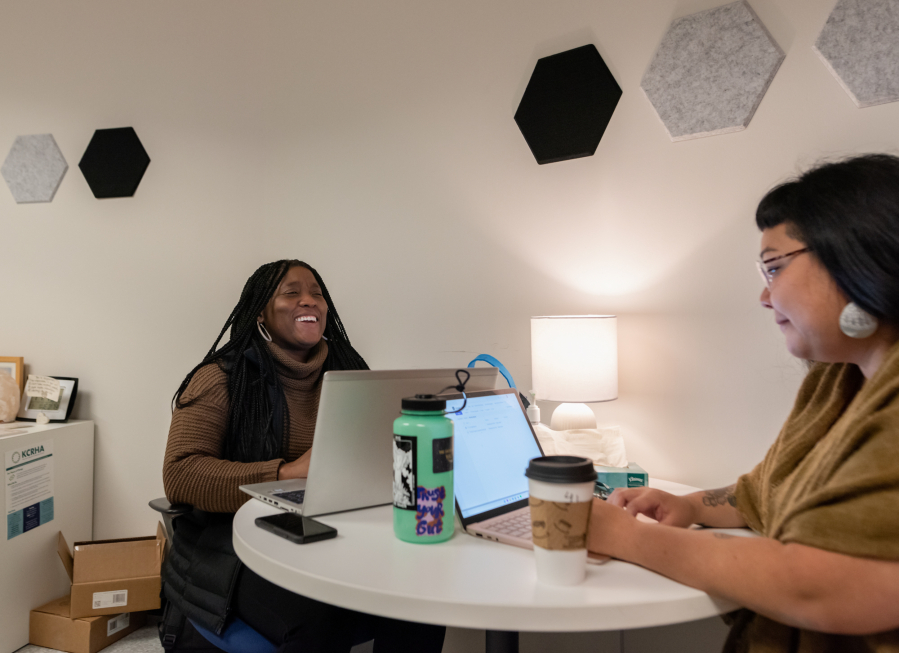Katara Jordan adjusts her cellphone against her ear with one hand while the other dances across her laptop’s keyboard.
She’s seated at a small circular table in a downtown Seattle conference-room-turned-office. With each call she takes, Jordan is providing a first-of-its-kind service to people experiencing homelessness in Seattle.
She works for the ombuds program established by the King County Regional Homelessness Authority last year. The program helps people navigate a tangled network of assistance and resolve problems they encounter along the way. No such program exists in Vancouver.
The King County ombuds team members said that with each encounter, they are not only helping people but taking feedback to make the system more effortless for people to maneuver.
Get Help
Council for the Homeless Housing Hotline: 360-695-9677
“Our main focus is, how can we address this problem to not only be the best for the person calling in, but also, how can we learn so that we can elevate system changes that lead to improvements,” Jordan said.
How it works
The idea for the Seattle-based homeless ombuds program, which employs five people, was conceived in 2019. It’s designed to act as a human resource, investigation and network hub.
As of November, 431 people had reached out to the program: 330 sought support and facilitation, 76 submitted complaints and 25 had general comments or concerns.
Complaints cover a range of issues, including staff mistreatment, shelter living conditions and housing delays. (The ombuds program does not address complaints from housed neighbors or about homeless encampments.)
After a resident experiencing homelessness or using the King County homeless system files a concern, the ombuds team reviews it and decides if it should be referred to another agency, investigated or mediated.
“A majority of the calls we receive are people asking questions … asking for navigation around services or information about services,” Jordan said. “Even though these are adjacent systems, we get a lot of questions about eviction … right before someone becomes homeless. So we do our best to try to direct people to those resources that are in a better position to help.”
Within its first year, the ombuds program has connected someone with an emergency housing voucher, helped a family find a missing homeless relative and secured $2,000 to help a person with moving costs.
One of the first cases ombuds staffer Raphael Hartman handled was a woman who didn’t have a case manager but needed to connect with the King County Housing Authority to reinstate her Section 8 housing voucher. He was able to connect her with services quickly.
“It only took like five minutes, but it was something she was dealing with for about six months,” Hartman said. “I’m not sure where she would be at if she didn’t contact us at the office.”
Navigating services
The Columbian’s homelessness reporters receive calls on a weekly basis from residents who need help navigating the housing system or who have complaints about various agencies.
Other calls go to the Council for the Homeless’ Housing Hotline, a chief resource for those navigating the system. But the hotline is not set up to take complaints about other agencies.
Council for the Homeless said a program like the ombuds program is important.
“We believe that having a clear and transparent process to share concerns, file grievances and register complaints is an important part of any well-functioning (system) and should always be a priority for a community,” Sunny Wonder, deputy director of Council for the Homeless, said in an email.
All of the calls to the council’s housing hotline are requesting service navigation to some extent, with most requesting rental assistance or emergency shelter, Wonder said. The council accepts grievances about Council for the Homeless or the Housing Solution Center through a form on its website, as well as by phone or email.
“For example, if someone felt they were wrongfully denied assistance, (Council for the Homeless) staff would assist with the form and/or review the completed form to identify the specific details of the issue,” Wonder said. “From there, we evaluate if any errors were made and determine what steps need to be taken if an error was made. If no error was made, we would work with the client to identify any other services for which they are eligible.”
Those using the homeless system also said a dedicated ombuds program would be useful.
Alicia Martinez, 38, said a program where people could call in complaints or raise concerns would be nice, because existing resources aren’t always designed for unhoused people.
She said people experiencing homelessness often don’t want to call law enforcement when they have a concern. And knowing which services do what or whom to call can also be hard to untangle, Martinez said, adding many are left to fend for themselves.
An ombuds program could also be helpful for those newly navigating the system. When Martinez became homeless six years ago, she said she was taught the basics from her cousin who was also living outside.
“Homeless people are a close unit. It’s family. We rely on each other,” Martinez said. “But it would be kind of cool to have somewhere else.”
The ombuds program believes that accountability means collaboration.
“Generally, the system needs a lot more support, especially coming out of the post-COVID era. We’ve learned that practices are not universal anymore. There is a lot of power and brilliance in community voice,” said Em Ishiki, who works for the ombuds program.
The program strives to learn from people reaching out, each time gleaning more information about how to improve the housing system. Soon, they hope to start mobile clinics to meet people where they are.
“This is a place where people can go to really raise their concerns and raise their voices,” Jordan said. “That is extremely important, and I think it’s long overdue.”





